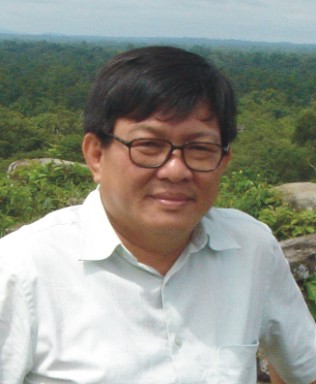
BANGKOK, Nov 20 (TNA) - Thailand will ask to post bail for the Thai engineer detained on spy charges in Cambodia within one or two days to free him on a temporary basis, according to the Thai Foreign Minister's Secretary Chawanon Intarakomalsut.
Cambodia Air Traffic Services (CATS) employee Siwarak Chutipong, 31, was arrested in Phnom Penh on spying charges last week when he was discovered releasing Thaksin Shinawatra’s flight schedule to a Thai embassy official in Phnom Penh.
Mr Chawanon said the Thai authorities had approached Kao Sopha, a Cambodian lawyer with experience in human rights protection, to be Siwarak's lawyer. Kao Sopha had met Mr Siwarak and is collecting information and evidence to write a request to provide bail for the engineer within one to two days to release him temporarily.
The representatives of Samart Corporation, CATS parent company, met Thai Foreign Minister Kasit Piromya to give information which could be useful to support Thailand’s belief that Siwarak has done nothing illegal, he said.
CATS is wholly-owned by the Samart Corporation and received a concession from the Cambodian government to supply aeronautical radio and air traffic control services to Cambodia.
The Foreign Ministry legal experts were studying the two countries’ Investment Protection Agreement to find options to help Samart Corporation, he said, adding that Mr Kasit had affirmed that the ministry would extend full help as it did not want the problem to be escalated to affect other people and other Thai companies invested in Cambodia.
Thani Thongphakdi, deputy director-general of the Foreign Affairs Ministry's Department of Information, told reporters that the lawyer was preparing the document for seeking bail but the date to submit the request had not been set. However, it could be early next week, he said.
After submitting the request, Cambodia is expected to take 10 days to consider whether to allow the bail.
In a related development, Thai Defence Ministry spokesman Col Thanatip Sawangsaeng said Thailand would host the Thai-Cambodian General Border Committee (JBC) extraordinary session November 26-27 at Pattaya in the eastern province of Chonburi.
The Thai and Cambodian defence ministers would head their delegations to the meeting, he said.
It was expected that the meeting would discuss the border situation, and military cooperation, said the spokesman. (TNA)




 Cambodia's Prime Minister Hun Sen (R) shakes hands with fugitive former Thai premier Thaksin Shinawatra at Hun Sen's residence in Kamdal province, near the outskirts of Phnom Penh November 11, 2009. Cambodia refused a request from Thailand on Wednesday to extradite Thaksin, in a widening diplomatic row that threatens to worsen Thailand's political crisis. Cambodia's Foreign Ministry handed over a statement refusing to extradite the billionaire, ousted in a 2006 coup and later sentenced to two years in prison for graft, just seconds after officials from the Thai embassy in Phnom Penh submitted the request. REUTERS/Stringer
Cambodia's Prime Minister Hun Sen (R) shakes hands with fugitive former Thai premier Thaksin Shinawatra at Hun Sen's residence in Kamdal province, near the outskirts of Phnom Penh November 11, 2009. Cambodia refused a request from Thailand on Wednesday to extradite Thaksin, in a widening diplomatic row that threatens to worsen Thailand's political crisis. Cambodia's Foreign Ministry handed over a statement refusing to extradite the billionaire, ousted in a 2006 coup and later sentenced to two years in prison for graft, just seconds after officials from the Thai embassy in Phnom Penh submitted the request. REUTERS/Stringer Cambodia's Prime Minister Hun Sen (R) meets with fugitive former Thai premier Thaksin Shinawatra for an interview at Hun Sen's residence in Kamdal province, near the outskirts of Phnom Penh November 11, 2009. Cambodia refused a request from Thailand on Wednesday to extradite Thaksin, in a widening diplomatic row that threatens to worsen Thailand's political crisis. Cambodia's Foreign Ministry handed over a statement refusing to extradite the billionaire, ousted in a 2006 coup and later sentenced to two years in prison for graft, just seconds after officials from the Thai embassy in Phnom Penh submitted the request. REUTERS/Stringer
Cambodia's Prime Minister Hun Sen (R) meets with fugitive former Thai premier Thaksin Shinawatra for an interview at Hun Sen's residence in Kamdal province, near the outskirts of Phnom Penh November 11, 2009. Cambodia refused a request from Thailand on Wednesday to extradite Thaksin, in a widening diplomatic row that threatens to worsen Thailand's political crisis. Cambodia's Foreign Ministry handed over a statement refusing to extradite the billionaire, ousted in a 2006 coup and later sentenced to two years in prison for graft, just seconds after officials from the Thai embassy in Phnom Penh submitted the request. REUTERS/Stringer Cambodia's Prime Minister Hun Sen (R) sits beside fugitive former Thai premier Thaksin Shinawatra for an interview at Hun Sen's residence in Kamdal province, near the outskirts of Phnom Penh November 11, 2009. Cambodia refused a request from Thailand on Wednesday to extradite Thaksin, in a widening diplomatic row that threatens to worsen Thailand's political crisis. Cambodia's Foreign Ministry handed over a statement refusing to extradite the billionaire, ousted in a 2006 coup and later sentenced to two years in prison for graft, just seconds after officials from the Thai embassy in Phnom Penh submitted the request. REUTERS/Stringer
Cambodia's Prime Minister Hun Sen (R) sits beside fugitive former Thai premier Thaksin Shinawatra for an interview at Hun Sen's residence in Kamdal province, near the outskirts of Phnom Penh November 11, 2009. Cambodia refused a request from Thailand on Wednesday to extradite Thaksin, in a widening diplomatic row that threatens to worsen Thailand's political crisis. Cambodia's Foreign Ministry handed over a statement refusing to extradite the billionaire, ousted in a 2006 coup and later sentenced to two years in prison for graft, just seconds after officials from the Thai embassy in Phnom Penh submitted the request. REUTERS/Stringer 

 BANGKOK, Nov 11 (
BANGKOK, Nov 11 (
